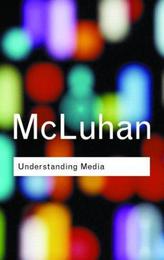
|
Understanding Media
Paperback
Main Details
| Title |
Understanding Media
|
| Authors and Contributors |
By (author) Marshall McLuhan
|
| Series | Routledge Classics |
|---|
| Physical Properties |
| Format:Paperback | | Pages:400 | | Dimensions(mm): Height 198,Width 129 |
|
| ISBN/Barcode |
9780415253970
|
| Classifications | Dewey:302.23 |
|---|
| Audience | | Undergraduate | | Postgraduate, Research & Scholarly | | Professional & Vocational | |
|---|
| Edition |
2nd Revised edition
|
|
Publishing Details |
| Publisher |
Taylor & Francis Ltd
|
| Imprint |
Routledge
|
| Publication Date |
18 May 2001 |
| Publication Country |
United Kingdom
|
Description
When Marshall McLuhan first coined the phrases "global village" and "the medium is the message" in 1964, no-one could have predicted today's information-dependent planet. No-one, that is, except for a handful of science fiction writers and Marshall McLuhan. Understanding Media was written twenty years before the PC revolution and thirty years before the rise of the Internet. Yet McLuhan's insights into our engagement with a variety of media led to a complete rethinking of our entire society. He believed that the message of electronic media foretold the end of humanity as it was known. In 1964, this looked like the paranoid babblings of a madman. In our twenty-first century digital world, the madman looks quite sane. Understanding Media: the most important book ever written on communication. Ignore its message at your peril.
Author Biography
Marshall McLuhan (1911-1980) Communications theorist, born in Canada. He is known as the original "high guru" of media culture and appeared in Woody Allen's Annie Hall as himself.
Reviews'McLuhan sings of the furthest reaches of electronic culture, when computer technology has replaced language with instant nonverbal communication.' - Wired Kirkus Review US:The Director of the Center for the Study of the Extensions of Man at the University of Toronto, Marshall MoLuhan here investigates the psychic and social consequences of technological media on man and his societies. The medium itself, rather than the content, is the message, he asserts, and turns to inspect the manner in which it affects us. He extends his inquiry beyond the expected media of print, radio, television, telephone to include "the mechanical bride" - the automobile, clothing - "our extended skin," money, clocks, housing. He differentiates between the cool and hot media, the former leaving more for the participant or user to do, the latter more comprehensive in its content - and indicates how these affect diversely the tribal or the individualistic culture. His insights into the nature of our society, the role the media play in it, the meaning of media, the actualities of the cold war (again that temperature reading is important) are provocative and brilliant. The printed word, however, is a cold medium, and this book requires concentrated reader application for reward. (Kirkus Reviews)
|